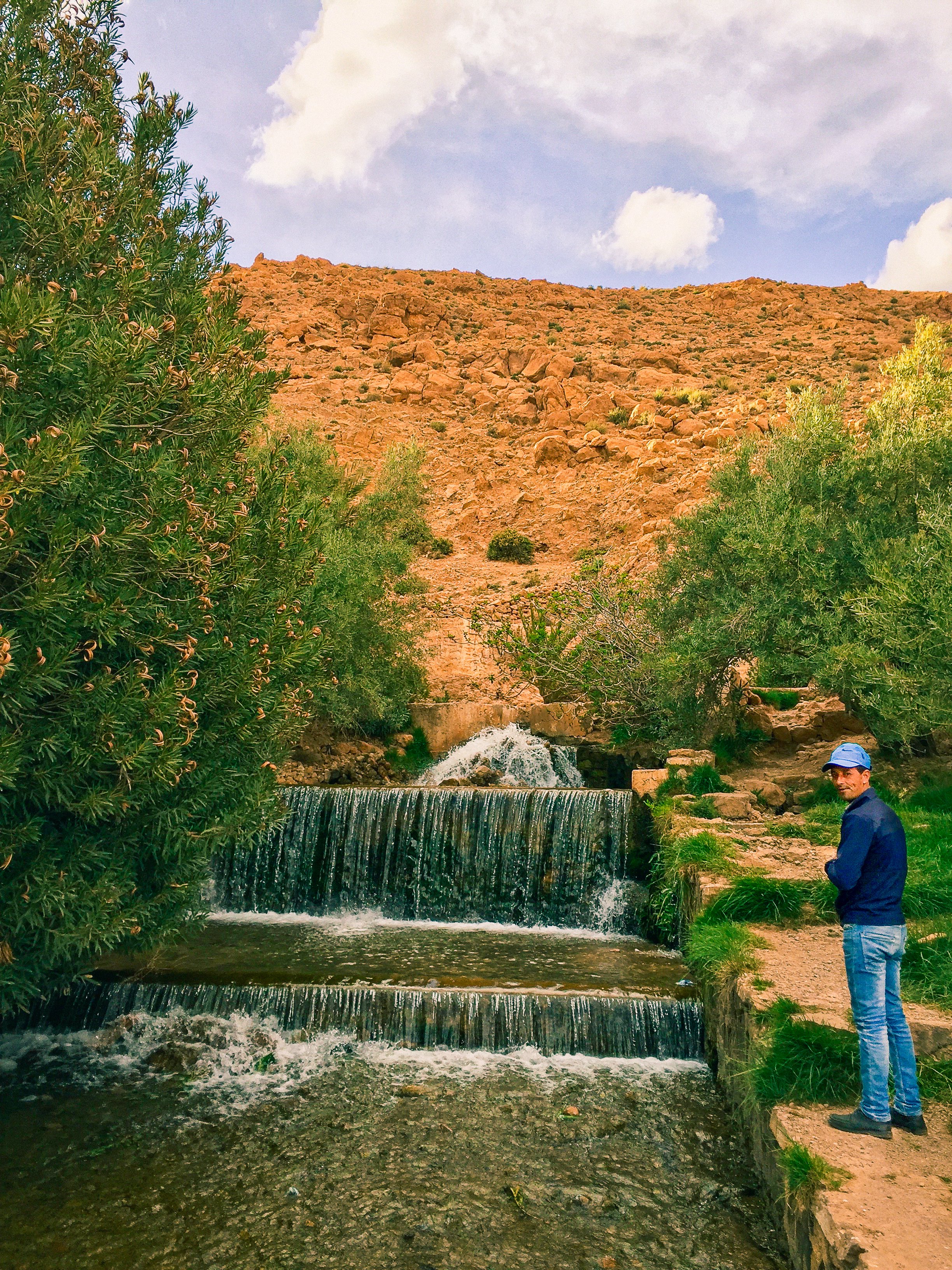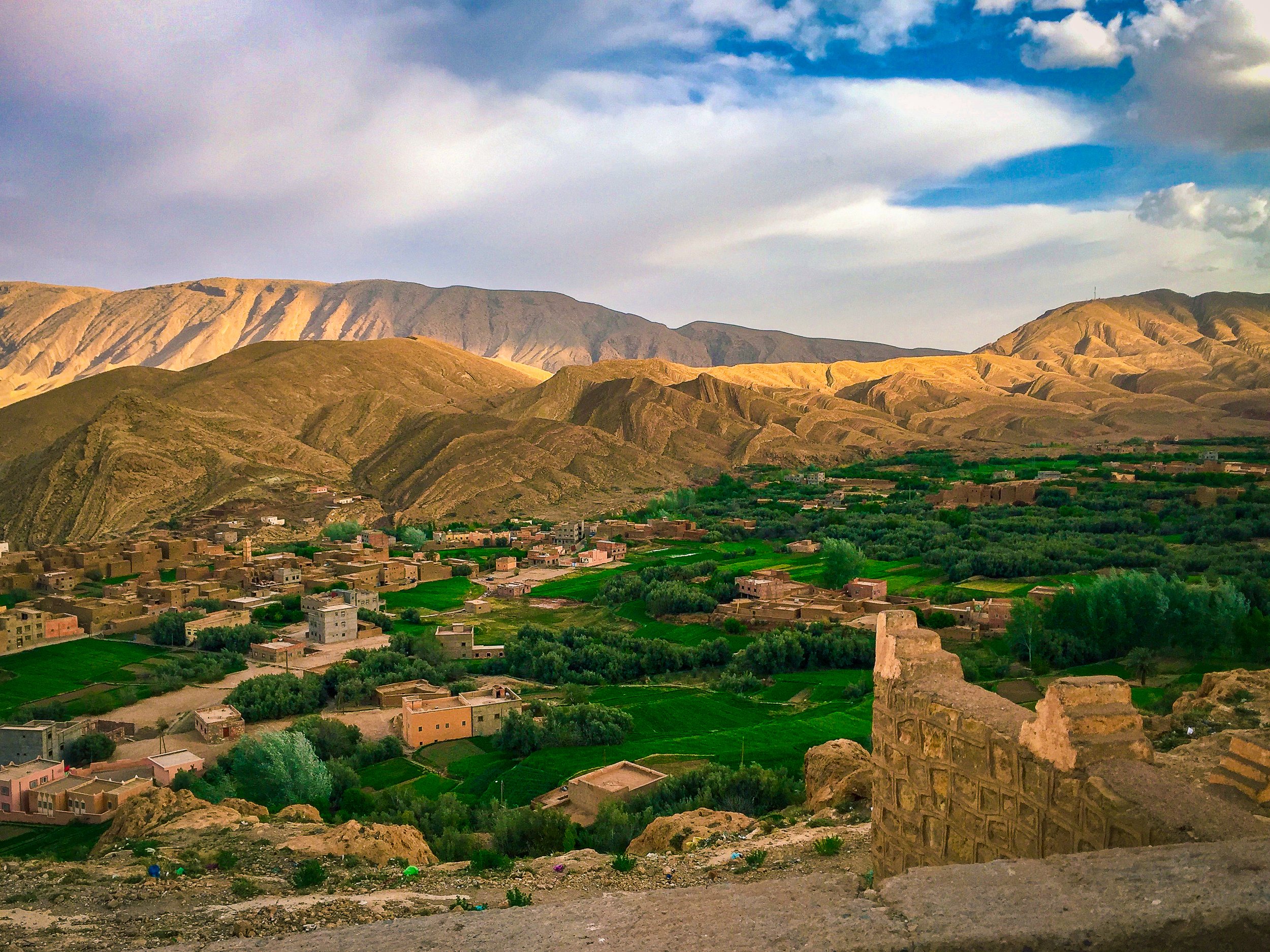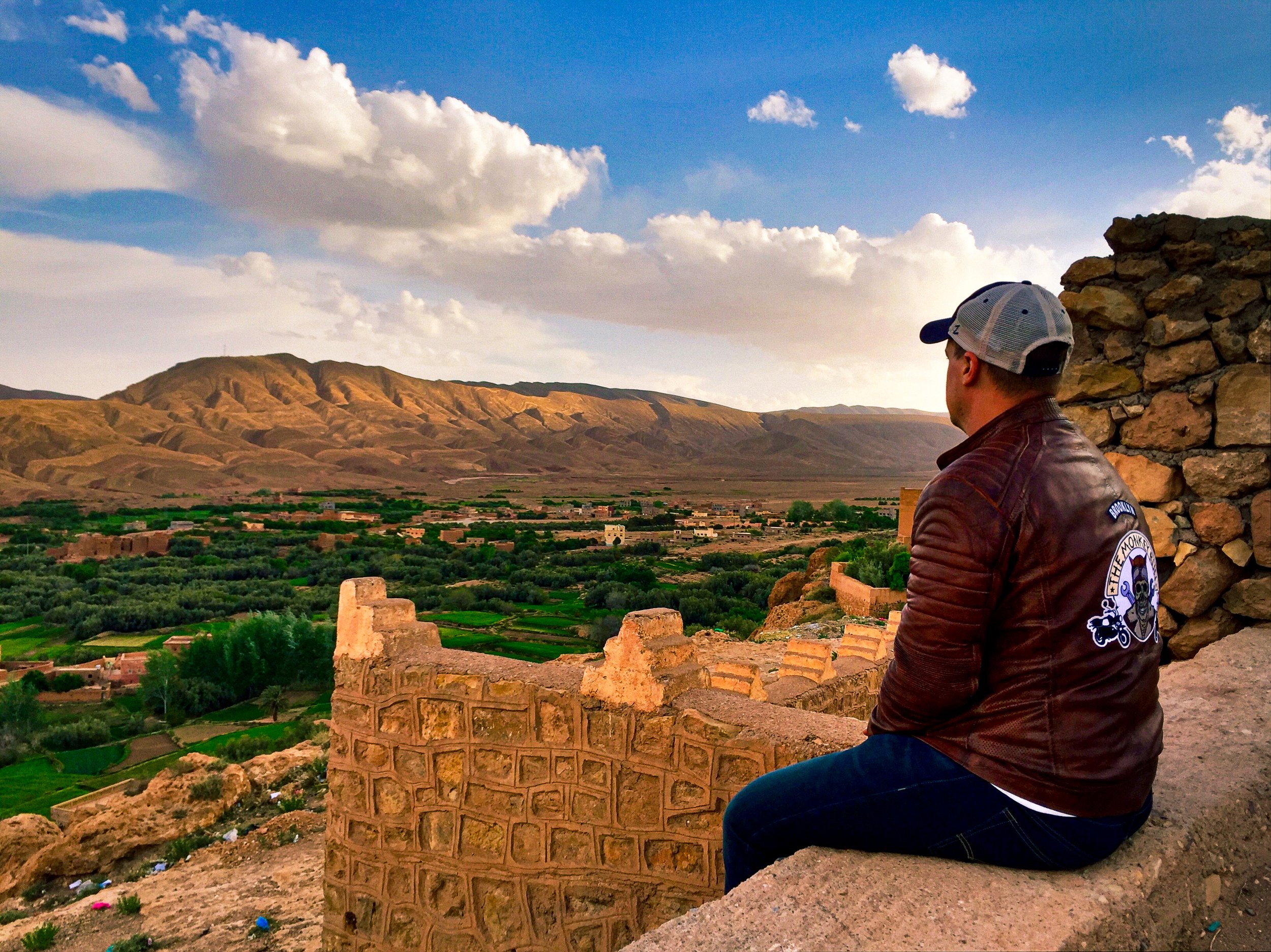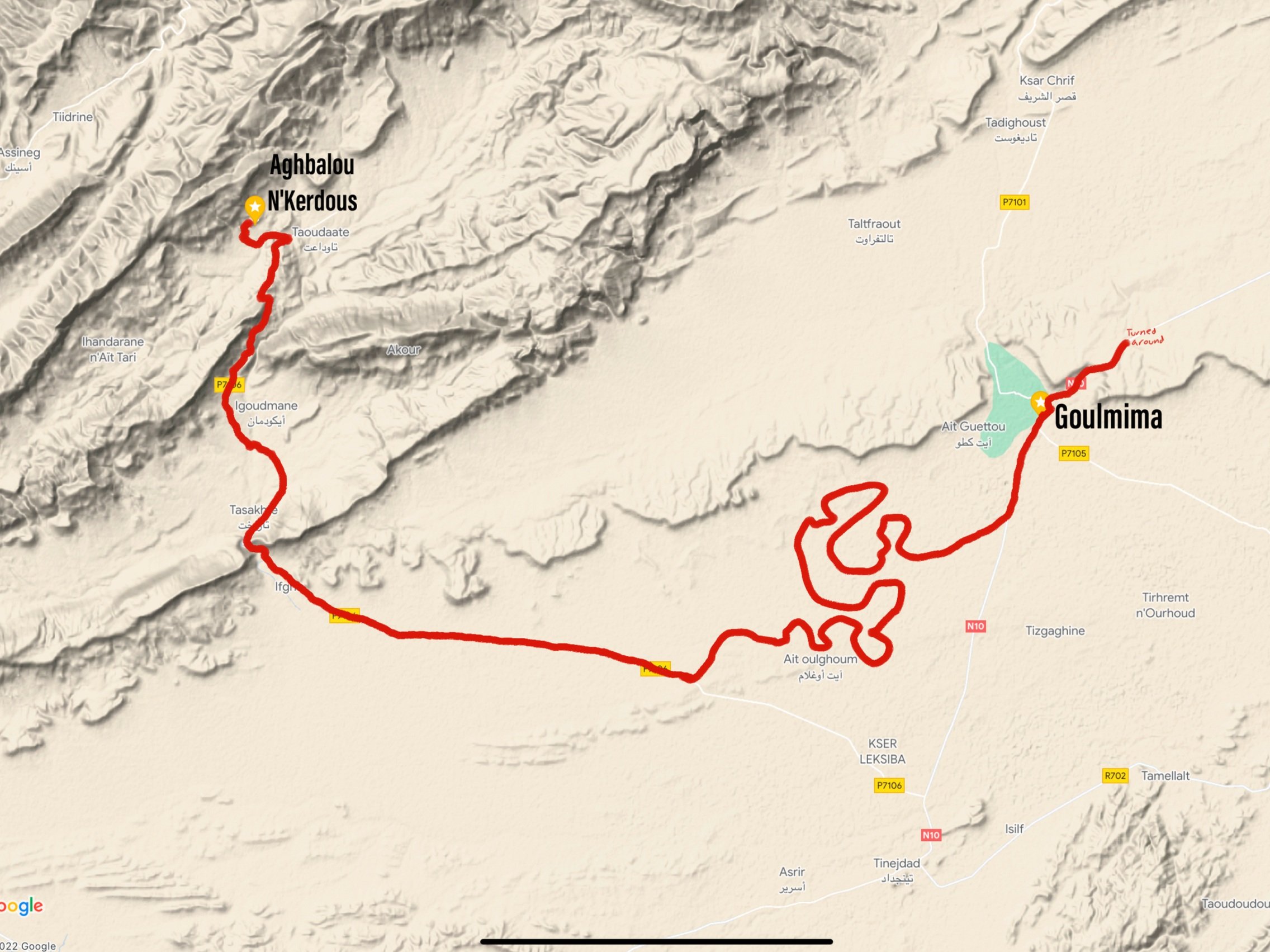
Day Two
Lost in Morocco
We’d barely made it out of Goulmima, when Kevin realized he had forgotten his helmet.
Little did I know, but this set the tone for what would eventually become one of the wildest days of my life.
While Danny and I waited for Kevin to return with his helmet, children appeared and started inspecting us and our bikes. This would become a theme.
Eventually a helmeted Kevin returned, and we continued on….
In the wrong direction.
We climbed a hill and rounded a corner, traveling about fifteen minutes down the road, enjoying the scenery and the air breezing against our leather MOTORCYCLE MEN jackets. Then we noticed two bikes tearing down the road coming towards us. Fellow monkey bikers! Our first sighting since shortly after the starting line. We waved and honked our horns and it wasn’t until a mile or two down the road before we realized that they were going the opposite direction. This was… concerning. We pulled over and consulted our maps and sure enough, we were headed the wrong way.
So we turned around and headed BACK through Goulmima, spitting out down the N10, heading, we’d hoped, in the right direction. After a couple more miles, we pulled over, pulled out the maps AGAIN, and recalibrated our plan. We decided to shoot for the larger circled town of Assoul. It was northwest of where we were, and would take us through the Atlas mountains, which would make for some fun riding. We also noticed a smaller road that cut the distance to where we figured we’d stop for lunch. That’d be perfect, we said. We didn’t want to spend the whole trip on the highway, and we figured we’d save some time and get to our destination early enough to not stress about a place to sleep like the night before.
There were several problems with this strategy that quickly became apparent and would follow us for the whole trip. Number one, smaller roads aren’t smaller roads, they’re just dirt paths that might be roads or could be paths to someone’s home, or could also just be dirt. This was compounded by problem number two, which was there weren’t any street signs or anything to signify these were actually roads and not just dirt.
So we drove down the road, passing these paths. Is this the one? Is this the one? We tried to use the distance measurements on the map and the kilometer markers on the highway (they at least had those) for help, but it was no use. Finally, we saw a path that looked more roadlike than pathlike, and took it. This HAS to be the one, we thought.
It wasn’t. We drove for an hour, through small village after small village, surprising the locals and causing quite a stir. It was a blast of a drive, bouncing about on the dirt “pistes” with our suspensionless bikes. But it was the wrong drive. We kept following the “road,” believing it had to be it, even though we had been heading East for quite some time. Finally, we stopped. “This can’t be right,” we said. So we turned around, pointed our bikes west, and took whatever “road” went that way.
Eventually, it worked. We found the main road again, and raced on towards the mountains.
Kevin asking for directions.
“Highway” XXXX
And then the highway simply ended.
Not ended as in, became a street. Ended as in disappeared. There was a “highway”, which was little more than a dirt path at that point, and then suddenly there were trees and a tiny stream. “Huh,” we said. “Oh, also, I’m basically out of gas,” Danny added. So we turned around and headed back to the center of the village we had just passed through.
There, we found the petrol shack. In the countryside, in lieu of gas stations, Moroccans use shacks, and instead of pumps they have 1 liter Coca-cola bottles filled with petrol. At the station slash shack, a teenager tried to rip us off so much that we knew it was crazy, and we refused. We argued a bit, and after we made enough of a stink, a man (along with the rest of the village) came over to settle things. This dude was looking sharp, in a tracksuit and a wide smile. He seemed to be in charge, or at the very least, well respected. We thanked him, filled up, and asked in our best hand gestures, “Um… where are we?”
Where we were ended up being a surprisingly difficult question to answer. The town names villagers used were different than the names on the street signs, which were different than the names on the map. But we eventually figured out that to get to the closest bigger map dot, we needed to go about 25 kilometers back the way we came, pass through the town of Izcal before finding a “piste” another kilometer past the village. We’d turn onto that, drive another two hours through the desert, and viola – the bigger map dot.
Or, the man said, we could always stay in town!
They had lots of great places to stay, the man said. This all felt to me like the beginning of a horror movie. But on the other hand, we were tired. We were hungry. We were stressed from spending the day lost, and not the least bit confident we could find the piste, or make our way across it in the dark. Kevin didn’t have any camping equipment, and we didn’t have any confidence. So we said what the hell.
Then we were taken to our hotel.
Danny using every single one of his brain cells to decipher that the map is upside down.

It was a construction site.
As soon as we agreed to stay, the upstanding gentleman we were talking to handed us off to another man wearing sweatpants and a beaming, gap-toothed smile. This was Rachid. Rachid looked sketchy, to put it nicely. We exchanged glances, but like, what could we do at that point? We followed him as he hopped on his own scooter and led us down the street, before turning onto a path. We drove through an olive grove and then turned into our hotel.
Which was about 30% completed.
To be fair, you could see that it had all the aspirations of a hotel. Eventually. Some day. The dark grey cinder blocks formed the shape of a residence. Inside, in the “lobby” – the only room we’d see – large sleeping pads were stacked in the corner, still in their plastic wrap. Bare bulbs dangled from exposed wires above our heads. The front yard was mostly mud. The hotel furniture consisted of five plastic chairs and the white plastic table everybody in college with a backyard owned.
We looked at each other and laughed, very, very nervously. It was all we could do really. It’d be dark soon. So we smiled and laughed again and said “Shukraan” (thank you) a bunch and waited to see if we’d be waking up in the morning.
This was the lobby. And dining area. And bedroom.
Rachid’s friend Ismail arrived. Rachid spoke zero English and we spoke zero French or Arabic, but Ismail spoke high school level Spanish, like Danny and Kevin. They pulled the chairs and table onto the porch, poured us some mint tea (as is custom) and brought us some bread (as is also custom). They also set out a plate of olive oil drizzled with honey. I took a bite. All I’d eaten in this country was bread, so I was expecting more of the same. But holy shit, was it incredible.
Ismail pointed to several small white boxes sitting against the hotel’s brick wall fence. They were beehives. Then he pointed over the wall, to the olive grove we had ridden through. We quickly realized the food we were eating had been born literal feet away. And I sat there, mashing the bread into the oil, thinking that it was one of the best things I’d ever eaten, while at the same time wondering if it was the last thing I’d ever eat.
Then Ismail offered to take us on a tour of the village.
He led us through town, communicating through a combination of broken Spanish, exaggerated hand gestures and confused smiles. But no translation was required for just how GREEN this place was. It was like a tiny piece of Ireland had sprung up in the middle of a desert. We quickly discovered the reason. Aghbalou had been built around a small spring that flowed from the mountain side. It was clear how important this spring was to the town; it was the first thing Ismail showed us, and he mentioned it several times throughout the tour. He made us drink from the spring – which we did – and then tried to get us to drink from one of the clay troughs that sliced their way down the mountain, irrigating the village – we politely declined.
He also showed us the important houses, including another partly built hotel. “Not finished,” Ismail scoffed, even though it looked just as incomplete as our current accommodations. Then he took us to Rachid’s store for a glass of Fanta and more conversation, if you could call it that. We sat in plastic chairs outside of the store and enjoyed the green fields all around us, while trying to ignore the stares from the alleyways as the entire village came out to gawk.
Suddenly, Rachid piped up. “You pooped?!” He said excitedly. “We looked at each other, stunned. “Pooped?!” Rachid asked again. As it turns out, a woman who worked for the Peace Corps did some time in town in 2012. Apparently Rachid had picked up some English phrases from her. And by phrases I mean phrase. He knew one phrase. And it was “Are you pooped?”










But we WERE pooped.
We were really pooped. So they took us back to the “hotel.” Unfortunately, dinner was still an hour away. While we waited, Ismail – and Rachid when he wasn’t making our meal – continued to talk to us. I think they were thrilled to have company, regardless of how dirty or tired or confused that company might’ve been. We tried our best to keep up, but we were deliriously hangry.
Suddenly, another man appeared.
We were told, like it wasn’t 9:30 at night, that this dude was here to install some tiles upstairs. Completely normal. Tyler (our name for him) disappeared and we heard him hammering away above us… for twenty minutes. I guess he installed a single tile, wiped his hands, and called it a night. He reappeared and spread a blanket out in the opposite corner of the lobby. Seeing the confusion on our faces, Ismail assured us, “No problem.” Apparently Tyler was going to sleep with us. We looked at each other again. What we could do?
While we were each contemplating just how difficult night driving was actually, really, Ismail popped out of his chair. It was dinner time.
Dinner was, surprise, Tagine. When traveling to Morocco, this is the only item on the menu in the countryside. It actually was one of the better Tagines we’d had during the trip, but we were too exhausted and stressed and exhilarated to truly enjoy it. Then, after dinner, Ismail said his goodbyes, turned off the light, shut the front door, and locked it from the outside. COMPLETELY NORMAL.











